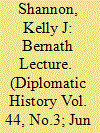|
|
|
Sort Order |
|
|
|
Items / Page
|
|
|
|
|
|
|
| Srl | Item |
| 1 |
ID:
172590


|
|
|
|
|
| Summary/Abstract |
To borrow a concept from Community, one of my favorite TV shows, it often feels as though we’re currently on the “darkest timeline.” So I thought I’d start my Bernath Lecture with something lighthearted … like a murder. In April 1921, a woman in Washington, D.C. shot and killed her husband. Then, as now, it was much less common for a wife to murder her husband than the reverse. What makes this case particularly noteworthy to me was the fact that the wife, early twenty-something Lydia Gertrude Kanode Molavi, was American, and her twenty-six year-old husband, Abdul Hussein Molavi, was Iranian.
|
|
|
|
|
|
|
|
|
|
|
|
|
|
|
|
| 2 |
ID:
172595


|
|
|
|
|
| Summary/Abstract |
In June 1974, U.S. Navy scientist Sam Ridgway stepped off an airplane in Moscow. It was his first trip to the Soviet Union, and he was excited. As head veterinarian of the Navy’s Marine Mammal Program, he knew his Soviet counterparts were studying captive bottlenose dolphins, but Cold War tensions had long prevented the two sides from sharing much of their research. Months earlier, however, the Superpowers had signed an agreement to cooperate on environmental research, opening the way for this visit. At first, things went smoothly. Soviet handlers met Ridgway and his colleague, former Lockheed engineer Bill Evans, at the airport and whisked them to their hotel. Over the following days, they enjoyed access that would have been unimaginable a decade earlier. “We had free run of Moscow,” recalled Ridgway, “and we met many Russian scientists.” During those friendly conversations, the Americans were repeatedly surprised by their Soviet counterparts’ knowledge of U.S. research publications, which extended to a number of “obscure” journals. Marine mammalogy, it seemed, offered a bridge across the Cold War divide.
|
|
|
|
|
|
|
|
|
|
|
|
|
|
|
|
| 3 |
ID:
172591


|
|
|
| 4 |
ID:
172594


|
|
|
|
|
| Summary/Abstract |
In September 1945, with a Proclamation issued in the manner of an imperial fiat, President Harry S. Truman claimed “jurisdiction and control” over the subsoil resources of the continental shelf.1 This expansionist act differed from better known moments of U.S. territorial imperialism as the land involved was on the offshore continental shelf and submerged entirely underwater.
|
|
|
|
|
|
|
|
|
|
|
|
|
|
|
|
| 5 |
ID:
172592


|
|
|
|
|
| Summary/Abstract |
“Violent collision between Japan, China and Taiwan! The bloody battlefields of fishermen’s ‘Senkaku tuna war.’”1 So read the headlines of a Japanese magazine in 2013, while fisheries diplomacy was ongoing and fishery treaties were being negotiated among the three parties. These negotiations came after a series of violent encounters between fishermen in the waters around a group of uninhabited islets in the south of Okinawa and to the north of Taiwan, called Senkaku in Japanese and Diaoyu in Chinese. This was just one among many headlines in the news about conflicts over marine resources below the surface of the sea, migrating fish being one of them, after the creation of Exclusive Economic Zones, enacted by the third United Nations Convention on the Law of the Sea (UNCLOS) in 1982. This international resolution established that zones of 200 nautical miles could be subsumed under national jurisdiction by coastal states, with those states having the sole right to exploit the zones’ marine resources.
|
|
|
|
|
|
|
|
|
|
|
|
|
|
|
|
| 6 |
ID:
172593


|
|
|
|
|
| Summary/Abstract |
Shortly after the Second World War, as the Sixth Fleet moved into the Mediterranean in 1950, U.S. hegemony was scarcely contested in this Sea. Twenty years later, the U.S. Navy’s dominance was still undisputed in southern Europe, but the situation was rather different underwater. Between the nationalization and first closing of the Suez Canal in 1956 and the 1973 Arab-Israeli war, the Eastern Mediterranean underwent what must have been history’s largest buildup of U.S. and Russian submarines per cubic meter.
|
|
|
|
|
|
|
|
|
|
|
|
|
|
|
|
| 7 |
ID:
172596


|
|
|
|
|
| Summary/Abstract |
In 1977, an American Baptist minister and civil rights leader named Leon Sullivan proposed a set of six principles to govern U.S. investments and business operations in South Africa. These principles included the elimination of workplace discrimination, pay equality, education, and sponsoring social programs and community investment. Sullivan previously fought for equal employment opportunities for African Americans in the United States, and he hoped that by making the same opportunities available to blacks living under apartheid, apartheid would be undermined at a social and economic level. Sullivan also hoped that companies would use their privileged position to lobby for political change.
|
|
|
|
|
|
|
|
|
|
|
|
|
|
|
|
|
|
|
|
|